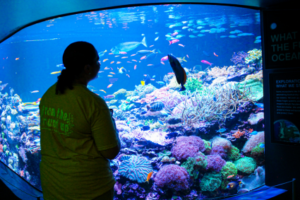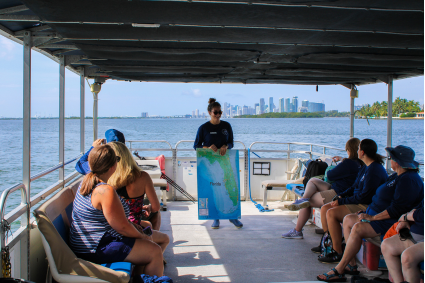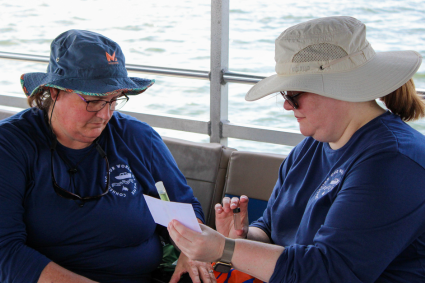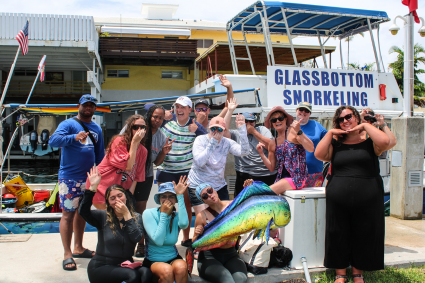Overview
The International SeaKeepers Society and Georgia Aquarium invite middle and high school educators in Georgia to apply for a free two-and-a-half-day, three-night professional development opportunity in Miami, Florida. Through hands-on field experiences and research, teachers will use Biscayne Bay as a case study to explore anthropogenic impacts on different ecosystems found along coastal communities.
Teachers will receive a Certificate of Completion for this professional development activity.
Upcoming Workshop:
Georgia Aquarium & The International SeaKeepers Society
Teacher Workshop in Miami, Florida: June 19th - 22nd, 2025
> Applications due Sunday, May 4th, 2025 at 11:59pm ET
> Decisions distributed by Monday, May 12th, 2025 at 11:59pm ET
> Mandatory in-person meeting at the Georgia Aquarium on Monday, June 2nd at 11:30 AM (with lunch and a tour of the aquarium included) and a mandatory virtual pre-workshop meeting on Wednesday, June 11th at 10:00 AM.


Field Activity 1: Ecological Impacts of Urban Cities
Biscayne Bay is the crown jewel of Miami, however, the Bay’s proximity to such a large and ever-growing city in a highly populated state has left lasting impacts on its ecosystems. Through a set of on-the-water activities, teachers will learn the history of Biscayne Bay, the ecosystems that it encompasses, and the threats it currently faces. Teachers will learn about the impacts of pollution on this body of water, take measurements of water quality, and, with a little luck, meet some of the inhabitants of the Bay. These activities will provide hands-on experiences to illustrate the ecological impact of humans on coastlines, which will be later applied to more local examples.
Field Activity 2: Impacts of Plastic Pollution on Ecosystems
Plastic pollution has become a large issue across the world, from busy urban areas to even the most remote islands. To learn more about the impact of such debris on wildlife, teachers will visit a small, remote island known to be a nesting area for many local birds, and collect data to determine the most common types of marine debris and plastic on the island using the app Marine Debris Tracker. Teachers will discuss sources of the most common items, and propose solutions for reducing plastic on the individual scale as well as community scale.
Field Activity 3: Biology & Ecology of Marine Organisms
Miami is home to many different types of marine life. After exploring Biscayne Bay and becoming familiar with many of the species that reside in this area, teachers will head into the coastal waters of the Atlantic to explore reef ecosystems and their residents. Through a snorkeling tour, teachers will learn about the different adaptations fish use to thrive in different environments and explore the role of coral reefs as ecosystem engineers.
Activity 4: Bringing It Home
The Southeastern US has incredible biodiversity, especially when it comes to freshwater animals. In this concluding workshop, teachers will examine the ecology of the Chattahoochee Metro-Atlanta region, including invasive species and their impacts to the local habitats. Teachers will work together to analyze data points on the Chattahoochee’s current conditions and correlate impacts to the region’s ecology.
Other experiences:
Throughout the experience, teachers will learn more about The International SeaKeepers Society and our resources as well as Georgia Aquarium’s local programming for teachers. Participants will also learn about conservation research efforts by local and global scientists and receive access to hands-on activities and other resources for classroom use.
Airbnb address: 1031 NE 90th St. Miami, FL 33138
Please review the tentative itinerary here
DAY 1 – Thursday, June 19th:
Afternoon: teachers arrive & transported to accomodation
4:30 PM: Welcome, Introduction to SeaKeepers & Georgia Aquarium, Ice Breaker Activity
6:00 PM: Guest Speaker – Miami Waterkeeper, Introduction to Biscayne Bay
7:30 PM: Dinner at local restaurant, speaker invited
DAY 2 – Friday, June 20th:
8:00 - 9:00 AM: Breakfast & review day’s activities at Airbnb
9:30 AM: Arrival at Bill Bird Marina
10:00 - 11:30 AM: Field Activity 1: Introduction to Biscayne Bay, local pollution, and water quality
11:45 AM – 12:30 PM: Lunch on picnic island
12:30 - 2:00 PM: Field Activity 2: Impacts of Plastic Pollution on Ecosystems
2:00 - 2:30 PM: Travel back to Airbnb
2:30 - 4:30 PM: Break & dinner orders
4:30 - 6:00 PM: Classroom/adaptive activities presentation by SeaKeepers and ecosystem survey
introduction for Field Activity 3
6:00 PM: Dinner at Airbnb
DAY 3 – Saturday, June 21st:
7:30 - 8:30 AM: Breakfast & review day’s activities at Airbnb
9:30 AM: Arrival at marina (TBD) for Field Activity 3
10:00 AM – 1:00 PM: Field Activity 3: Biology & Ecology of Marine Organisms (lunch aboard boat)
1:00 - 2:00 PM: Travel back to Airbnb
2:00 - 4:00 PM: Break & dinner orders
4:00 - 6:00 PM: Activity 4: Bringing it Home, workshop feedback collection, experience sharing, conclusions
6:00 PM: Dinner at Airbnb
DAY 4 – Sunday, June 22nd:
8:00 AM: Early morning breakfast & pack up at Airbnb
10:00 AM: Local educational field trip (TBD) and farewells
TBD: Teachers transported to airport
S7L4. Obtain, evaluate, and communicate information to examine the interdependence of organisms with one another and their environments.
○ Analyze and interpret data to provide evidence for how resource availability,disease, climate, and human activity affect individual organisms, populations, communities, and ecosystems.
SB5. Obtain, evaluate, and communicate information to assess the interdependence of all organisms on one another and their environment.
○ Plan and carry out investigations and analyze data to support explanations about factors affecting biodiversity and populations in ecosystems.
○ Construct an argument to predict the impact of environmental change on the stability of an ecosystem.
○ Design a solution to reduce the impact of a human activity on the environment.
○ Construct explanations that predict an organism’s ability to survive within changing environmental limits (e.g., temperature, pH, drought, fire).
SEC1. Obtain, evaluate, and communicate information on how biotic and abiotic factors interact to influence the distribution of species and the diversity of life on Earth.
○ Ask questions to predict the cause and effect of varying levels of abiotic and biotic factors on a habitat in Georgia.
○ Construct an argument based on evidence to explain factors that lead to sustainability of biodiversity in an ecosystem.
SEC5. Obtain, evaluate, and communicate information on the impact of natural and anthropogenic activities on ecological systems.
○ Analyze and interpret data on the ecological impacts of sustainable and unsustainable use of natural resources and predict the cause and effect of
unsustainable use of natural resources on ecosystems.
○ Construct an argument based on evidence to predict the impact of climate change on an ecosystem.
○ Obtain, evaluate, and communicate mitigation strategies to reduce the impacts of non-sustainable activities on Georgia ecosystems.
SO1. Obtain, evaluate, and communicate information about how and why humans explore our ocean.
○ Define problems and challenges associated with oceanographic research and exploration.
SO3. Obtain, evaluate, and communicate information to model the flow of energy in the ocean.
○ Ask questions to investigate relationships between biotic and abiotic factors in marine ecosystems including estuaries, coral reefs, kelp forests, the open ocean, and the deep ocean.
SO6. Obtain, evaluate, and communicate information on the physical and chemical properties of seawater and how they influence the structure of the ocean.
○ Develop and use a model to demonstrate how the ocean and land are connected by the hydrologic and other biogeochemical cycles.
○ Plan and carry out an investigation to discover the unique properties of seawater when compared to fresh water.
SO7. Obtain, evaluate, and communicate information about how humans use the ocean as a resource and the need for responsible stewardship.
○ Construct an explanation based on evidence on how recreation and transportation impact marine ecosystems.
○ Analyze and interpret data to investigate the causes of ocean acidification, biomagnification of pollutants, ocean deoxygenation, and eutrophication.
○ Design and evaluate a sustainability plan that includes conservation efforts to reduce human impact on the ocean.
SMI7. Obtain, evaluate, and communicate information to analyze the impact of microorganisms in the environment and their uses in biotechnology, agriculture, and industry.
○ Ask questions to investigate the roles of microorganisms in global nutrient cycling and primary production in soil, fresh water, and marine ecosystems.
○ Analyze and interpret data to determine the impact of microorganisms on water and soil quality.
SZ5. Obtain, evaluate, and communicate information to analyze the relationship between humans and animals within various phyla.
○ Ask questions and define problems identifying the cause and effect of human activities on the biodiversity of organisms (including habitat destruction,
overharvesting, water consumption, and pollution).


Contact Information:
Toni Lohroff, M.S.
Director of Education & Outreach
International SeaKeepers Society
[email protected]
+1 269-369-5766
Bailey Dawson, Jr., Ed. S.
Director of Education
Georgia Aquarium
[email protected]
+1 404-581-4152

You must be logged in to post a comment.